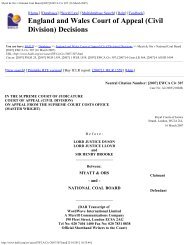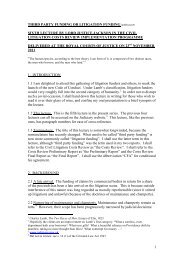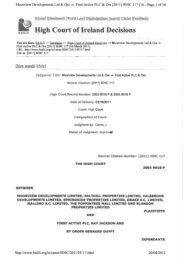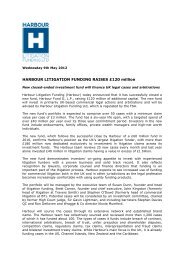[2013] SGHC 135 - Singapore Law Watch
[2013] SGHC 135 - Singapore Law Watch
[2013] SGHC 135 - Singapore Law Watch
Create successful ePaper yourself
Turn your PDF publications into a flip-book with our unique Google optimized e-Paper software.
<strong>Law</strong> Society of <strong>Singapore</strong> v Kurubalan s/o Manickam Rengaraju [<strong>2013</strong>] <strong>SGHC</strong> <strong>135</strong><br />
38 In Ravindra Samuel at [15] it was further said that “where a solicitor<br />
has acted dishonestly, the court will order that he be struck off the roll of<br />
solicitors”.<br />
The rationale for s 107 of the Act<br />
39 In our view, the actions of the Respondent were undoubtedly improper<br />
and fell well short of the standard of behaviour to be expected of Advocates<br />
and Solicitors; but these actions did not amount to dishonesty by the standards<br />
of ordinary and reasonable men: see Twinsectra Ltd v Yardley [2002] UKHL<br />
12 at [30], applied in Bultitude v The <strong>Law</strong> Society [2004] EWCA Civ 1853 at<br />
[32]. The Respondent did not admit to dishonesty and there was no finding<br />
that he had in fact acted dishonestly.<br />
40 The case before us is thus not one that concerned dishonesty. How then<br />
are these interests of punishment, deterrence and the protection of public<br />
confidence in the administration of justice to be sufficiently upheld by means<br />
of a suitable sanction? To answer this, it is necessary first to examine the<br />
nature of the offence. Maintenance is defined as officious intermeddling in<br />
litigation (see Hill v Archbold [1968] 1 QB 686 at 693) and champerty is a<br />
particular form of maintenance “where one party agrees to aid another to bring<br />
a claim on the basis that the person who gives the aid shall receive a share of<br />
what may be recovered in the action”: Otech Pakistan Pvt Ltd v Clough<br />
Engineering Ltd and another [2007] 1 SLR(R) 989 (“Otech Pakistan”) at [32].<br />
The origins of the offence of champerty are traceable to medieval times, 16 but<br />
the public policy implicated by it might have evolved somewhat since then. In<br />
16<br />
See Percy Henry Winfield, “The History of Conspiracy and Abuse of Legal<br />
Procedure” (Cambridge University Press, 1921) at chapter VI.<br />
22


![[2013] SGHC 135 - Singapore Law Watch](https://img.yumpu.com/37488807/22/500x640/2013-sghc-135-singapore-law-watch.jpg)
![Neutral Citation Number: [2010] EWHC 941 (QB) - Harbour ...](https://img.yumpu.com/47188668/1/190x245/neutral-citation-number-2010-ewhc-941-qb-harbour-.jpg?quality=85)
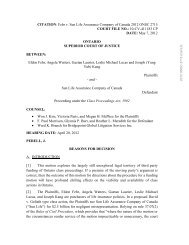
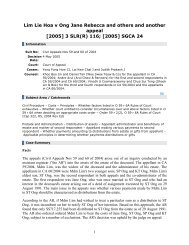
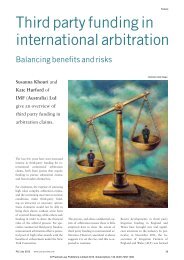
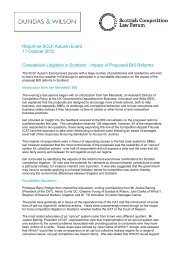
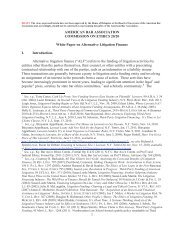

![Hall v Poolman [2009] - Harbour Litigation Funding](https://img.yumpu.com/37488843/1/190x245/hall-v-poolman-2009-harbour-litigation-funding.jpg?quality=85)
